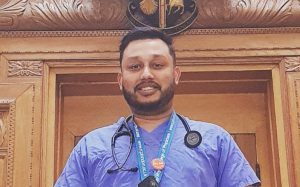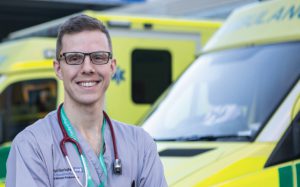As the COVID-19 crisis continues, CONNECTED speaks to two University of Reading graduates who have been working on the frontline to fight this pandemic.
Reading graduates, Sadek Alam and Adam Calthrop, are just two of a number of Physician Associates (PA) working at the Royal Berkshire Hospital after successfully completing the course at Reading several years ago. Sadek, who works within the Surgical Liaison Service and Adam, who works in the Emergency Department, both took very different routes into their medical careers. Both agree that it was one of the best decisions they ever made, and they are now working on the frontline to beat COVID-19.
Hands-on experience
Launched at the University of Reading in 2015, the Physician Associate programme – which has been developed in partnership with the Royal Berkshire Hospital and Berkshire Healthcare Trust – is a two-year postgraduate course delivered by practising healthcare professionals and academics, and offers students hands-on workplace experience alongside intensive evidence-based academic work. Students interact with patients throughout the course and can use their skills across the whole of the NHS.
 Sadek, who originally hails from Bangladesh, studied forensic science at the University of West London before moving to Reading to take up the PA course in 2016. After graduating, Sadek gained employment at the Royal Berkshire Hospital. He said:
Sadek, who originally hails from Bangladesh, studied forensic science at the University of West London before moving to Reading to take up the PA course in 2016. After graduating, Sadek gained employment at the Royal Berkshire Hospital. He said:
“I always liked the medical environment, and the work-life balance of the PA role really appealed to me as I am always looking for ways to help other people. Before I started my course, I knew the PA programme was still very new in the UK, so I was excited to be part of this new profession.
“When I began work at the hospital, I did not know what I wanted to specialise in. The combination of medicine and surgery really drew my attention, and within a month I knew this was the job for me.”
Intensive learning
 Adam, who has been working in emergency medicine for two-and-a-half years, had a very different approach to his career having completed a degree in biological sciences from the University of Reading. He said:
Adam, who has been working in emergency medicine for two-and-a-half years, had a very different approach to his career having completed a degree in biological sciences from the University of Reading. He said:
“The PA course itself is tough. That is not an exaggeration, as most of the clinical knowledge learnt in three years of medical school is crammed into two years. When I studied, the first six months of the course were all lecture-based at the University, and the next six months were split equally between lectures and placement in an acute medical or GP setting. The final year is mainly placement with just one day at the University every two weeks.”
Adam started working in the Emergency Department less than a week after qualifying.
“I knew I wanted to work in a generalist area, such as emergency medicine, acute medicine or general practice, as PAs tend to fit these areas very well given their generalist training.
“I have definitely fallen in love with emergency medicine in my time working here, and I work with an amazing team.”
Fighting COVID-19
Since the start of the pandemic, both Sadek and Adam have seen their working lives change dramatically and have been working hard to fight COVID-19 at the Royal Berkshire Hospital. Sadek said:
“I have been seconded to other medical wards, but with the change of working environment and working with different teams in the hospital, I believe this has helped me to progress as a clinician and given me experience in areas I would not normally work in. As such I feel more prepared for future problems of a similar scale.
“What really humbles me is the amazing dedication and commitment of all the other people in the trust; from our senior management team organising the overall plan, to the consultants putting in extra hours and making difficult decisions, to the junior doctors, nursing staff, cleaners, physios, porters, lab team and many more.
“The whole hospital has really pulled together, and now I see the Trust as a family rather than a place to work.”
Adam also spoke to us about his experience of working on the frontline, and why he would encourage anyone interested in becoming a PA to use this time to volunteer and gain relevant medical experience.
He said: “In emergency medicine there is no average day, every day is different. But since the start of the pandemic, I have never seen so few patients coming through our A&E. Overall the patients who do come in are much sicker, requiring more time to sort out, and we are admitting a far higher percentage – but this is still overall less people than we admitted prior to the pandemic on an average day.
“I am acutely aware that I am seeing a lot of patients with probable COVID-19, but thankfully I haven’t fallen ill. I have also been helping to design and smooth out our ambulatory COVID-19 pathway, which allows us to discharge patients who have likely COVID-19 and who would otherwise be admitted, with their very own pulse oximeter which they can use to take their oxygen levels at home.
“It concerns me that we have far less people with heart attacks, strokes and other problems coming into the emergency department, because if they aren’t coming to us that means they are staying at home likely due to fear of contracting COVID-19.
“We have separate areas for people with respiratory symptoms and non-respiratory problems, and the benefit of coming in if you have an emergency problem is far higher than the low risk of contracting COVID-19. I will repeat what the Royal College of Emergency Medicine is saying: ‘If you have an emergency problem, come to A&E, we are prepared, we can help and we will always be here for you’.
“To anyone who is interested in becoming a PA, I would say use this time to volunteer for the NHS or as a carer, and gain as much experience as you can.
“The most rewarding aspect for me is the combination of getting the right diagnosis using your knowledge and skill, and watching people improve in front of you. The thanks from patients and family members makes it all worth it.”
Find out more about Reading’s Physician Associate programme.







